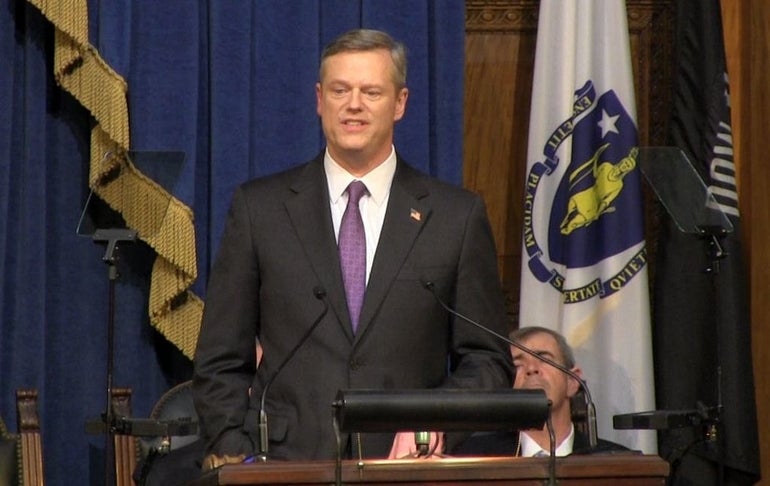The offer to serve on President Donald Trump’s new opioid commission presented Gov. Charlie Baker with an opportunity to serve at a level he has tried to avoid – the federal level.
The Republican governor, in his two-plus years in office, has been reluctant to step out onto the national stage, even as he emerged as one of the more popular state political figures in the country for his ability to govern in a deep-blue state.
The reward of being able to help address an addiction crisis that claimed over 50,000 lives around the country in 2015, however, appears to have outweighed the political risk of associating himself with a president disliked by a great majority of Massachusetts voters.
“From my point of view, if I can help bring some of the things we’ve been able to accomplish here in Massachusetts onto a national stage so that, for example we could have a nation in which you can’t graduate from medical school, dental school or nursing school without passing a course in opioid therapy and pain management, that would be a really good thing,” Baker told reporters on Thursday.
Baker received the call to serve on the commission from New Jersey Gov. Chris Christie, who Trump tapped to lead the panel that will make recommendations by October.
Christie played a major role in helping to elect Baker in 2014 when he was head of the Republican Governors Association, and Baker endorsed Christie’s presidential campaign before refusing to vote for Trump in November.
“He and I have talked about opioids and addiction generally a lot over the course of the past several years and this is an issue that he’s done some very good work on in New Jersey and he takes very seriously,” Baker said of Christie, who will be term-limited out of office this year.
New Jersey recently enacted a law to limit initial opioid prescriptions to a five-day supply, following the model pursued by Baker and Bay State lawmakers in 2016 when they put in place a seven-day restriction. Baker initially called for a 72-hour limit.
Massachusetts, like New Jersey, is one of the states that has been hit particularly hard by opioid addiction. The Department of Public Health reported in February that 1,465 people died of unintentional opioid overdoses in 2016, with another 469 to 562 suspected opioid-related deaths.
There were 1,579 opioid overdose deaths in 2015 and 1,321 in 2014, according to DPH figures.
Given those statistics, it’s no surprise that combating the epidemic has become a centerpiece of the governor’s work. In addition to first-time prescription limits, Baker has worked with provider groups and the heads of medical schools to improve doctor training for pain management and prescribing practices.
“I view it as hopefully an opportunity to put onto the national stage some of the solutions we’ve been pursuing here in Massachusetts,” Baker said.
Trump on Wednesday signed an executive order establishing the President’s Commission on Combating Drug Addiction and the Opioid Crisis. The group, which includes several Cabinet secretaries, has been tasked with identifying existing federal funding to combat addiction, assessing the availability and accessibility of treatment and evaluating federal drug abuse prevention programs.
The commission must make initial recommendations to the president in three months and produce a final report by October.
Asked whether he was worried about being tied to the controversial White House, Baker noted North Carolina Gov. Roy Cooper, a Democrat, was also on the panel.
“I think this issue, the opioid epidemic, is something that cetainly here in Massachusetts and I believe around the rest of the country, is not a partisan issue,” Baker said.
Some Democrats, however, have questioned the White House’s commitment to combating the opioid epidemic, pointing to the president’s federal budget blueprint that would slash spending on some treatment and recovery programs.
For example, Trump has proposed a $100 million cut to mental health block grants administered by the Substance Abuse and Mental Health Services Administration.
“Trump is paying lip service to families devastated by the opioid crisis. While he’s staging photo ops around this deadly epidemic, he’s also trying to kick patients off their lifesaving treatment,” U.S. Rep. Katherine Clark said in a statement. “Ask any doctor, first responder or mayor, and they’ll tell you what we need is immediate funding resources for prevention and treatment of opioid use disorder. What we don’t need is an empty gesture like Trump’s commission.”
Baker said part of the commission’s goal will be to “point out what the role of the fedeal government can be and how the federal government can be successful.”

